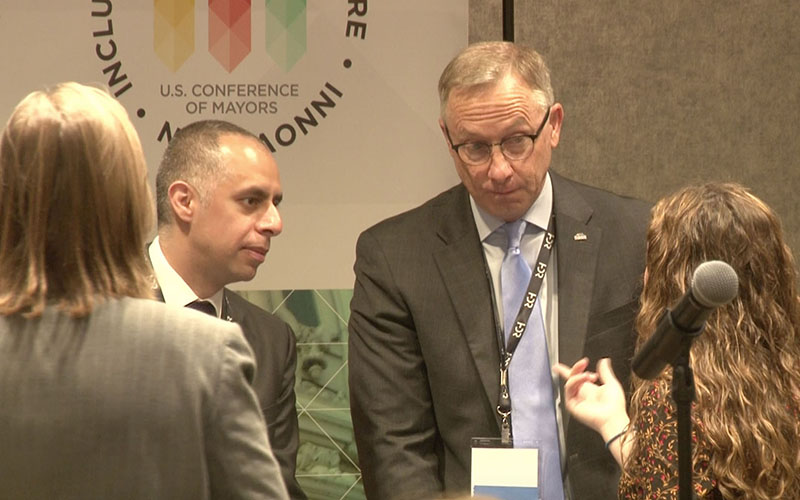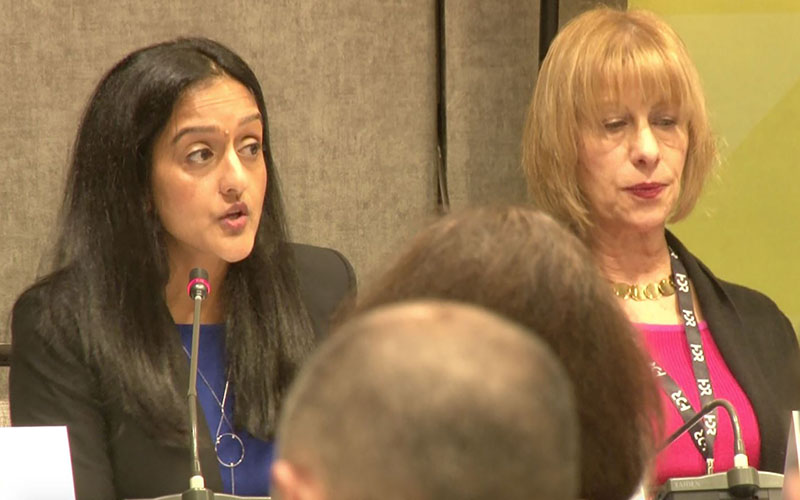
Mesa Mayor John Giles, right, and Providence, Rhode Island, Mayor Jorge Elorza talk to audience members after a panel on the impact that a question on citizenship might have on response rates for the 2020 Census. Mayors fear it could have a “chilling effect” and result in an undercount. (Photo by Alyssa Klink/Cronkite News)
WASHINGTON – Mesa Mayor John Giles derided the Trump administration’s plan to ask people their citizenship status on the 2020 census, calling it a “just stupid” move that could cost local governments federal funding and congressional representation.
Giles was part of a U.S. Conference of Mayors panel Thursday on the 2020 Census that considered whether the citizenship question would have a “chilling effect,” leading to an undercount of all citizens and underrepresentation of key demographics.
“That’s going to have everyday impact in thousands of ways because this is the baseline we use for all kinds of government data for the next 10 years,” Giles said. “It’s critical to Mesa, it’s critical to Arizona that we have a very accurate census account.”
The citizenship question has not been asked for decades. The Justice Department in 2017 requested that it be included on the 2020 census to collect data that would help enforce the Voting Rights Act.
The Commerce Department, which oversees the Census Bureau, last year agreed to include the question. In a memo announcing the decision, Commerce Secretary Wilbur Ross acknowledged concerns that the question might result in low participation, but said any reduction in response would be outweighed by the value of the data gained.
Opponents of the move say they are already fielding concerns, more than a year before the Census is set to be taken.

Leadership Conference CEO Vanita Gupta, left, with census expert Terri Ann Lowenthal. Gupta said her organization is already hearing from people who plan to boycott the 2020 Census over the citizenship question. (Photo by Alyssa Klink/Cronkite News)
“People are coming to us, and they’re probably coming to the mayors as well, saying, ‘We don’t want to answer the census. We’re going to boycott it,'” said Vanita Gupta, president and CEO of the Leadership Conference, who was at the mayors’ meeting.
A supporter of the move calls that “an absolute ridiculous claim.”
“Somehow we are supposed to believe … that a question on an anonymous form is somehow going to scare people from responding to the census form. It’s absolutely absurd,” said Ira Mehlman, media director at the Federation for American Immigration Reform, which advocates for tougher immigration laws.
Mehlman called the furor over the question “whipped-up hysteria by advocacy groups.”
Giles, a Republican, disagreed.
“The idea of adding a citizenship question to the census is just stupid,” he said. “It’s going to have a chilling effect. It’s going to result in people being intimidated by the census.”
A federal court last week agreed, ruling Ross’ decision to include the citizenship question “ignored, cherry-picked or badly misconstrued the evidence” of the impact the question could have and that he “violated the public trust.”
The Justice Department said Tuesday that it will ask the Supreme Court to review the district court’s ruling on an expedited basis, since the decennial census is fast approaching.
The data collected in 2020 will impact 2021 congressional and legislative redistricting in Arizona, affecting the number of seats the state has in Congress and the number of representative that cities and counties have in the State House. Federal officials will the same data to determine the distribution of federal funding and to sort through grant applications from cities for programs and infrastructure.
“It’s all based on data. So if you have bad data, or data that understates who you are, that’s going to come back to you in smaller allocations,” Giles said. “Particularly for cities like Mesa, which are very fast-growing, this has a tremendous impact.”
-Cronkite News video by Alyssa Klink
Mesa had 496,401 residents in 2017, the latest year for which Census Bureau estimates are available, up by 57,360 from the population recorded in the 2010 census. That moved the fast-growing city from 38th- to 36th-largest in the country between 2014 and 2017.
Arizona has continued its steady population growth, tying Florida in 2017 for fastest-growing state from the year before. Arizona’s booming population has seen its number of House members grow from just three in the 1960s to nine today, with many expecting the state to add a 10th congressional district after the coming census.
“The citizenship question isn’t just a decennial headcount, it’s a snapshot of the country at any given point in time,” Mehlman said. “There’s absolutely no reason why we shouldn’t collect some hard data on the number of non-citizens who are living in the country.”
But for Giles, the census is too important for Mesa’s growth to risk underrepresentation.
“The point of the census is not to use it as a political tool to accomplish political means,” Giles said. “We’re going to have to live for the next 10 years with these numbers.”